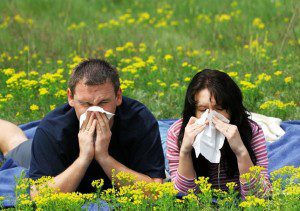By Deane Alban
Contributing Writer for Wake Up World
More people consider spring their favorite season above all others. But for millions, the accompanying sneezing, coughing, itchy eyes, and brain fog of seasonal allergies make spring a time to be dreaded rather than enjoyed. And this spring is predicted to be worse than usual. The long, cold winter and higher-than-average snowfall mean some plants are primed to produce more pollen, according to allergy specialists. [1]
Besides the usual sneezing, coughing, and watery eyes, inhalant allergies can leave you with serious brain fog, inability to concentrate and focus, fatigue, irritability, and depression.
Typically, people with allergies seal up the house and try to stay indoors. Then they try one of the myriad over-the-counter antihistamines. Many are under their doctor’s care taking prescription medications or getting allergy shots. These can definitely take the joy out of this beautiful season.
But there are much better ways to cope with this annoying problem.
The Real Cause of Seasonal Allergies
Most people blame pollen or mold spores for their seasonal allergies, but these aren’t the real cause at all! Allergy symptoms are caused by an overactive immune system. Your immune system produces substances known as antibodies that protect you from unwanted invaders that could make you sick or cause an infection.
[pro_ad_display_adzone id=”110028″]
When you have allergies, your immune system is producing antibodies in response to exposure to things like pollen, dust, or pet dander that it perceives as harmful, even though they aren’t. It’s not the exposure to allergens that are the root cause of your allergies, it’s your body’s overreaction causing the cascade of allergic symptoms.
5 Natural Allergy Relief Strategies
Here are five ways to tackle your seasonal allergies without drugs or medications. Take these steps to keep your allergies under control this season and prevent attacks in the future. You may even get permanent relief!
1. Minimize Allergen Exposure
Minimizing exposure to allergens gives your immune system less to react to. Here are steps to take to reduce your contact with pollen:
- Close your windows on high pollen count days to prevent it from blowing inside in home. Keep your car windows up and use the AC when driving. If you’re in your car a lot consider getting an automobile air purifier. (Not to be confused with a car air filter which has nothing to do with passengers’ air quality!)
- Do outside activities like light gardening, walking, and other forms of outdoor exercise or chores when pollen levels are relatively low. Trees and weeds typically release pollen in the morning, while grasses release pollen both morning and night. Get someone else to do your heavy gardening chores like grass cutting, weed whacking, and leaf blowing. If you must do these activities, immediately take a shower, throw all clothes in the laundry, and wipe down your shoes when done.
- Make your bedroom an allergen-free zone. Giving your body eight hours in a “pure” environment can definitely lighten your allergic load. Get an air purifier just for the bedroom. Keep your bedroom scrupulously clean. Having hard surfaces — like hardwood floors instead of carpet, and vinyl blinds instead of curtains — can make this job easier. Avoid sleeping with pets who bring in pollen and distribute their dander in your bed. Don’t use chemical air fresheners, and certainly don’t smoke or let anyone else smoke in the bedroom.
Closing up your house can cause other problems, however. The level of air pollutants in the average home is 10x’s the level of pollutants outside. Dust, pollen, mold spores, tobacco smoke, and pet dander accumulate if your house is sealed shut. This can contribute to developing allergies all year long! If you close up your house, clean up your inside air with a good air purifier.
A free and easy way to learn which allergens are currently peaking is to sign up for pollen tracking updates from Pollen.com. Enter your zip code to receive email alerts of high pollen counts in your area. I used this to help me figure out which general types of plants I was allergic to.
Having this heads-up can be a big help in knowing when it’s time to start taking precautions. In general, year-round allergens are dust mites, mold spores, and pet dander. Spring pollen mainly comes from trees, early summer pollen is mostly from grasses, and late summer pollen is predominately ragweed.
2. Use a Saline Spray
One weird way to minimize allergic response is to keep the inside of your nose clean with a saline nasal spray. Over-the-counter saline nasal sprays can help relieve stuffiness and congestion and they won’t lead to the rebound congestion that can follow from the use of nasal decongestants.
When your nasal passages are dry, mild nasal crusting may occur, and bacterial infections can develop under these crusts. Saline sprays clean the nasal passages of crusts and mucus and also help the natural cleaning system of your nasal passages flushing away pollen in the process. [2]
Taking antihistamines contributes to this drying of your nasal passages. When the inside of your nose gets very dry, it can crack and develop microfissures, creating the perfect environment for infection and allowing pollen to directly enter your system. In extreme cases these fissures can lead to nosebleeds.
Saline nasal sprays may sting slightly. If you find it too uncomfortable, try a preservative-free version or one that’s designed for kids.
3. Boost Your Immune System
Since allergies are fundamentally an immune system problem, for true and long-lasting relief you need to boost yours with the right foods and nutrients.
Omega-3 fatty acids are critical for preventing allergies. This highly anti-inflammatory compound is not reliably found in the modern diet except in grass-fed meat and wild-caught salmon, so for most people supplementation is a must. I use a high-quality krill oil rather than the usual fish oil. It’s an excellent source of astaxanthin, one of the most potent antioxidant, anti-inflammatory nutrients known. Read labels before you buy. Not all brands of krill oil contain this.
Vitamin D is another essential nutrient that has been found to reduce allergy symptoms and even asthma.
Wheat sensitivity doesn’t manifest only as digestive problems, it contributes to oversensitivity to environmental factors as well. Wheat sensitivity can cause problems you might not expect like nasal congestion, asthma, sore throat, and itchy eyes. [3] The culprit in wheat is gluten, a protein that triggers an autoimmune response thus causing inflammation.
Cut back on all grains. Don’t forget that when you eat grains you are actually consuming grass seeds. Many people report a dramatic reduction in hay fever and allergy symptoms from cutting back on grains in general, not just wheat.
Probiotics provide “friendly” bacteria that reduce allergic reaction to pollen as they heal your gut.
4. Manage Symptoms Without Drugs
If you’re already experiencing allergy symptoms, you want relief fast. But taking antihistamines doesn’t cure allergies or change the allergic process — they merely block its expression.
Dr. William E. Berger, one of the nation’s foremost experts on allergies and asthma, reports that nearly one third of allergy patients don’t think their medications work. [4] Besides, pharmaceutical remedies frequently come with unwanted side effects, such as drowsiness, headaches, and nasal irritation.
Antihistamines are also one of the groups of drugs known for causing brain fog and temporary memory loss. The sedative effects of these drugs can leave you feeling drowsy and impair your judgment and ability to drive.
There are a ton of natural allergy remedy options — some are proven to work but most have anecdotal evidence only. The University of Maryland’s Center for Integrative Medicine [5] suggests the following natural allergy remedies that have been shown to work without undesirable side effects:
- Nutrients: quercetin, spirulina, and vitamin C
- Herbal remedies: butterbur, stinging nettle, and astragalus
- Homeopathic remedies: Nux vomica, Arsenicum album, Allium cepa, and Euphrasia
- Chinese medicine: Biminne, a mix of 7 traditional herbs
An old standby is treating allergies with unprocessed, local honey which contains minute amounts of pollen unique to your area. [6] Inexpensive grocery store honey doesn’t contain the pollen or the nutrients you need.
You may not want to consume all that sugar or you may find honey’s not potent enough to do the trick. Regional homeopathic remedies are a reliable alternative that works on the same principle. These uniquely address allergens common to different regions of the US. I use a remedy specifically for my area and find it works very well!
5. Avoid Cross-Reactivity
Another way to minimize allergy symptoms is to be aware of cross-reactivity between plant proteins from pollen and commonly-eaten fruits or vegetables. The theory is that your immune system recognizes similarities between different allergens and will react against similar allergens.
These crosses are not at all obvious. For example if you’re allergic to ragweed, you should avoid bananas and if you’re bothered by grasses you should avoid celery. Who’d think? The Children’s Hospital of Philadelphia publishes a chart of cross-reactivity foods you can view here.
The Final Word
One last tip I learned the hard way. If you’ve ever considered moving to the desert to avoid allergies – don’t! There are over 2,800 species of native flowering plants in the desert southwest (more than in a typical forest) plus innumerable non-native landscape plants. Many people (myself included) find their allergies get much worse!
Start applying this two-pronged approach — minimize allergen exposure while building your immune system — and your allergies will almost certainly begin to subside. But be patient. It may time some time. Your immune system didn’t get out of whack in a day so it may take a season or two to rebuild yours to the point where you experience significant improvement.
References:
[1] http://www.nydailynews.com/life-style/health/ahh-choo-2014-spring-allergy-season-harsh-article-1.1728478
[2] https://web.archive.org/web/20180713083247/http://www.med.umich.edu/1info/FHP/practiceguides/Rhino/saline.pdf
[3] http://www.medicalnewstoday.com/articles/174405.php
[4] https://web.archive.org/web/20140616104705/http://www.motherearthnews.com:80/natural-health/six-natural-allergy-remedies.aspx
[5] http://umm.edu/health/medical/altmed/condition/allergic-rhinitis
[6] http://www.karger.com/Article/FullText/319821
Updated August 2014
Previous articles by Deane:
- Don’t Let These 10 Common Brain Myths Hold You Back
- 5 Ways to Tame Springtime Allergies Naturally
- Protect Your Brain and Bones with Strength Training
- Beat Brain Fog: Know the Causes, Symptoms and Solutions
- 5 Common Food Additives That Are Toxic to Your Brain
- Coconut Oil Cures Alzheimer’s Disease: Truth or Wishful Thinking?
- 6 Common Habits that Rob You of Essential Brain Vitamins
- The ABCs of Vitamins for Memory and Brain Health
- The Toll Being Overweight Takes On Your Brain
- Work Smarter, Not Harder: Everyday Memory Improvement Tips
- Eat Your Way Smart With a Brain Food Diet
About the author:
Deane Alban holds a bachelor’s degree in biology and has taught and written on a wide variety of natural health topics for over 20 years. Her current focus is helping people overcome brain fog, “senior moments”, and other signs of mental decline now, and preventing Alzheimer’s and dementia in the future.
The human brain is designed to last a lifetime, but modern life takes a greater toll on the brain than most people realize. Deane teaches the best ways to keep your brain healthy and stay mentally sharp for life at her website BeBrainFit.com.
[pro_ad_display_adzone id=”110027″]








